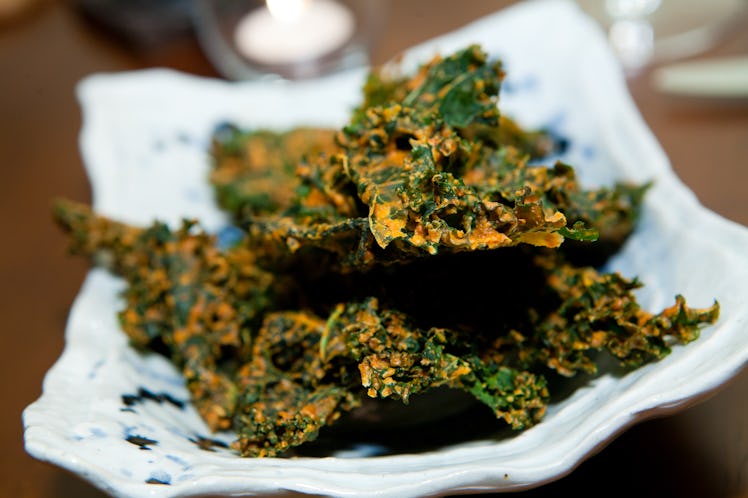
Kale Is Reportedly One Of The “Dirtiest” Vegetables, So Maybe Change Your Lunch Plans
Were you thinking of opting for a kale salad at lunch today, or perhaps snacking on some kale chips between meals? Based on some new research, you might want to rethink that. Kale is one of the "dirtiest" vegetables according to non-profit activist group The Environmental Working Group (EWG), and may not actually be the absolute epitome of health, despite what you may have heard. Well, there goes my post-workout smoothie.
The Environmental Working Group just released the 2019 version of its “Dirty Dozen” list, which ranks a dozen produce items that contain the highest amount of pesticides, even after the produce is peeled or washed. According to the EWG, the "dirtier" the food, the more pesticide residue it contains — and kale is one of the dirtiest. Everyone's favorite green leafy veggie is ranked No. 3 on the list for being one of the highest categories of pesticide-containing produce, trailing behind spinach at number two and strawberries at number one, and joined by other fruits and veggies like apples, nectarines, and grapes.
According to a post on the EWG website, 60 percent of kale samples sold in the United States contain pesticide residue, which the Environmental Protection Agency considers both a health and ecological risk. The EWG's kale samples showed a total of 18 different pesticides. Plus, kale and spinach samples had an average of 1.1 to 1.8 times as much pesticide residue by weight than any other crop.
Though EWG recommends switching to organic options to avoid pesticides, not all Americans have access to organic options and, in places where organic produce is more expensive than conventional produce, not all people can afford the price difference.
In addition to its "Dirty Dozen" list, the EWG also published a "Clean Fifteen" list featuring produce with the least amount of pesticide residue. And the winner is almost guaranteed to make you breathe a sigh of relief: the list includes avocados, sweet corn, pineapples, frozen sweet peas, onions, papayas, eggplants, asparagus, and kiwis, among others. In fact, samples of avocados and sweet corn contained less than one percent of detectable pesticides, and more than 70 percent of fruit and veggie samples on the list showed no pesticide residues. The EWG notes that buying conventional products listed on the "Clean Fifteen" list is perfectly fine.
The EWG's 2019 lists are consistent with findings from 2018 that showed produce like strawberries, spinach, apples, and nectarines on the list of foods containing high amounts of pesticides and avocados, sweet corn, pineapple, onion, and frozen sweet peas on the list containing lower amounts. Despite the repeats, there are some small differences. Though bell peppers were featured in last year's "Dirty Dozen" list, they are no longer included in EWG's 2019 shopper guide, in a good sign for all us salad lovers.
So next time you're out grocery shopping, you may want to refer to EWG's 2019 lists to help you determine which produce to buy organic and which conventional fruits and veggies are likely to be pesticide-free. Or maybe not — ignorance is bliss, after all.